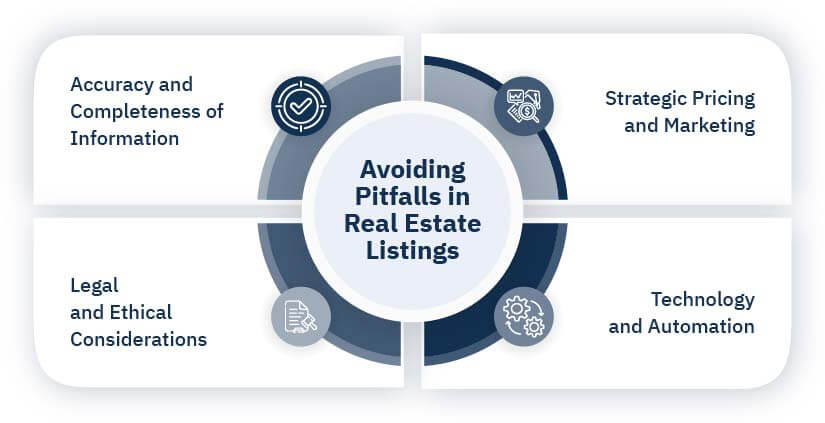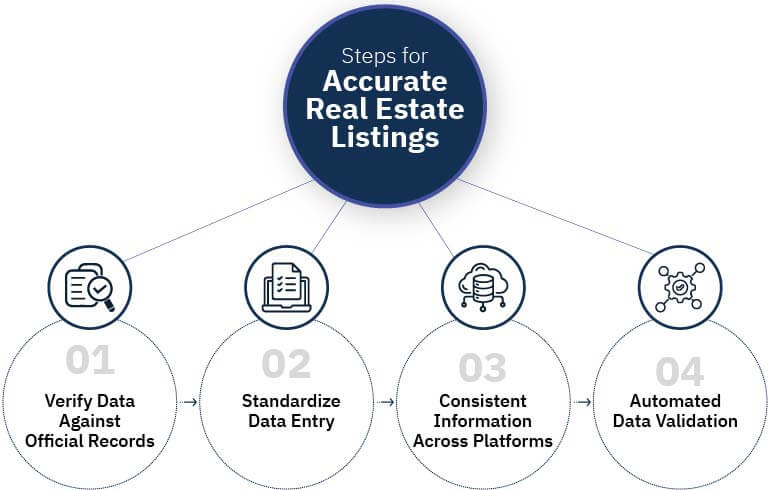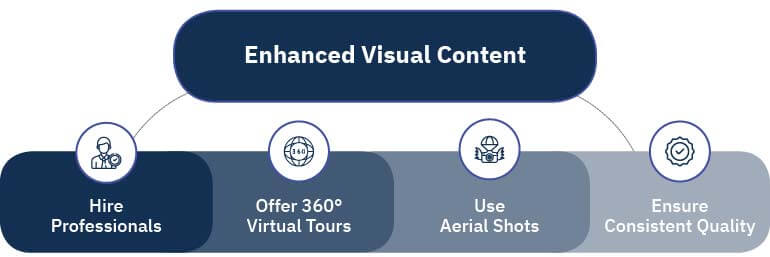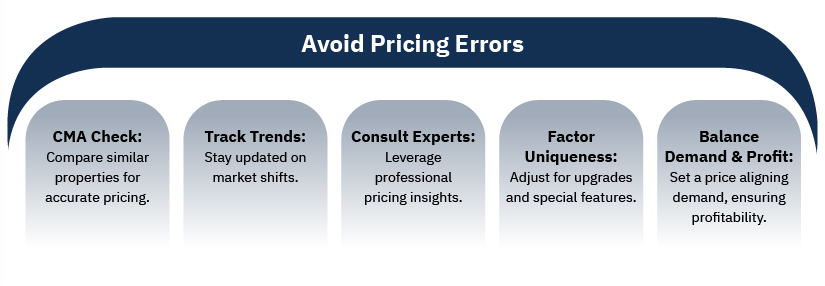- Accurate property details are crucial for preventing misinformation, building buyer trust, and minimizing legal risks. It is achieved through data verification and standardized data entry processes.
- High-quality photos and virtual tours significantly increase buyer interest. Professional photography and consistent visual quality enhance a property’s appeal.
- Property listing management tools offer valuable benefits, including automated updates, performance tracking, and ensured consistency. It reduces errors and improve operational efficiency.
Table of Contents
Effective real estate listing management is critical for maintaining a competitive edge in today’s dynamic property market. Yet, many businesses face recurring challenges that can compromise property visibility, delay transactions, and diminish client trust. In real estate, inaccurate property details, outdated listings, and non-compliance with industry standards are among the most frequent pitfalls that hinder operational efficiency and market reputation.
A well-structured real estate listing management system goes beyond mere property descriptions. It demands meticulous attention to data accuracy, adherence to compliance standards and the integration of technology-driven tools for automation and monitoring. Every homebuyer relied on the internet when searching for a property. Among the most valuable website features were property photos (41%) and comprehensive property details (39%). This highlights the critical role that high-quality property listings and images play in capturing buyer interests and driving informed decisions.
Here are proven strategies for real estate professionals seeking to refine their listing strategies and minimize costly errors.
Ways to Fix Common Errors in Real Estate Property Listings
Navigating common mistakes in real estate listing management is essential for maximizing property visibility and maintaining a competitive edge in the market. Here, we break down a range of common errors, from inaccurate information and poor image quality to pricing mistakes and inconsistent property descriptions. It provides actionable insights to help you avoid these pitfalls and improve the overall effectiveness of your listings, ensuring your real estate services stand out in a competitive market.

Accuracy and Completeness of Information
Accuracy and completeness of information are essential in real estate listing management. Maintaining precise listings attracts potential buyers and builds trust with clients. Errors in property details can result in missed sales, legal issues and reputational harm.
Clear and reliable listings help buyers make informed decisions and streamline the sales process. Inaccurate information, such as incorrect property descriptions or pricing, can lead to confusion, dissatisfaction and loss of client confidence.
Mistake: Inaccurate or Incomplete Property Details
Incomplete or inaccurate real estate listings pose a significant risk to both sales performance and professional reputation. Buyers rely on property details to make informed decisions, and any discrepancies—whether incorrect square footage, missing descriptions or inaccurate pricing—can create misaligned expectations, leading to buyer dissatisfaction and diminished trust.
Such inconsistencies not only hinder the buyer experience but also result in lost sales opportunities and inefficiencies in the sales process. Clear, comprehensive, and precise property listings are essential to building buyer confidence, enhancing market competitiveness, and safeguarding professional credibility.

How to Avoid:
- Verify Data Against Official Records: Cross-check all property details, including square footage, lot size, zoning information, and tax records, with official documents to ensure accuracy.
- Standardize Data Entry: Implement a checklist for property listings to ensure no critical information is left out.
- Consistent Information Across Platforms: Maintain uniform property details across all listing platforms to avoid confusion and build trust.
- Automated Data Validation: Leverage data validation tools that can help identify discrepancies and errors in property details before publication.
Streamlining Real Estate Data Management for a Leading NYC Realtor

Hitech optimized a New York realtor’s online database by collecting and entering data from 1350+ MLS and appraiser sites monthly. With a dedicated team of 5 experts ensuring zero errors and fast turnaround, the client achieved a detailed, accurate, and cost-effective property database.
Read full Case Study »Mistake: Poor Quality Photos or Lack of Visual Content
Low-quality or insufficient visual content can significantly diminish a property’s perceived value, directly impacting buyer interest and engagement. Images with poor lighting, unclear angles, or blurriness fail to showcase a property’s key features, often resulting in missed opportunities to capture buyer attention in a competitive market.
Effective visual representation is critical to creating a compelling listing. High-resolution images, strategic angles, and professional editing not only highlight the property’s strengths but also contribute to stronger buyer interest, increased inquiries, and faster sales outcomes.

How to Avoid:
- Invest in Professional Photography: Hire professional real estate photographers who specialize in capturing properties in the best light and angles.
- Leverage Virtual Tours: Offer 360-degree virtual tours or video walkthroughs to give potential buyers a more immersive experience.
- Consider Drone Photography: Use drone shots for larger properties or homes with unique landscapes to provide a comprehensive view.
- Maintain Image Consistency: Ensure all photos are of uniform quality and resolution to maintain a professional presentation.
Mistake: Missing or inaccurate property features and amenities
Failing to highlight essential property features or providing incomplete information about amenities can result in missed sales opportunities. Critical details, such as modernized kitchens, proximity to schools, or energy-efficient upgrades, often influence buyer decisions and can be the differentiating factors that drive engagement. Comprehensive property descriptions that emphasize unique features and value-added amenities empower buyers to make informed comparisons, improving visibility and accelerating sales potential.
How to Avoid:
- Highlight Unique Selling Points: Clearly emphasize standout features, such as a recently renovated kitchen, smart home integrations, or scenic views.
- Create a Comprehensive Amenities List: Include all features, such as swimming pools, garage space, security systems, and nearby landmarks.
- Use Relevant Keywords: Optimize listings with SEO-friendly terms like “energy-efficient home,” “luxury amenities,” or “family-friendly neighborhood” to improve visibility.
- Regularly Update Listings: Periodically review and update property details to ensure the information remains current and competitive.
Strategic Pricing and Marketing
Mistake: Overpricing or underpricing the property.
Setting an inaccurate price for a property can create significant challenges in the sales process. Overpricing often results in property lingering on the market for an extended period, discouraging potential buyers who may view it as overvalued or problematic. Conversely, underpricing can lead to lost revenue, as the property may sell quickly, but below its true market value.

How to Avoid Pricing Errors:
- Conduct a Comprehensive Comparative Market Analysis (CMA): Evaluate recently sold properties in the same area with similar size, location, amenities, and conditions to establish a competitive price.
- Monitor Market Trends: Stay informed about local market fluctuations, demand shifts, and pricing patterns to adjust your strategy accordingly.
- Seek Expert Guidance: Collaborate with experienced real estate professionals who can provide insights into pricing strategies tailored to your market.
- Consider Property-Specific Factors: Factor in unique elements such as upgrades, curb appeal, and special features that could impact value.
- Balance Demand and Profitability: Aim for a price that reflects market demand while ensuring a profitable return on investment.
Mistake: Limited marketing efforts or neglecting online platforms.
Relying on a narrow set of marketing channels can significantly limit a property’s exposure, reducing the likelihood of attracting qualified buyers. As the majority of property searches begin online, failure to leverage diverse digital platforms, such as property portals, social media and targeted campaigns, constrains visibility and audience engagement.
A multi-channel marketing approach incorporating both traditional and digital strategies is essential to maximize reach, generate higher inquiry volumes, and create competitive interest.

How to Avoid:
- Real Estate Portals: List the property on platforms such as Zillow, Realtor.com, and local MLS listings.
- Social Media: Share visually appealing posts, stories, and ads on platforms like Instagram, Facebook, and LinkedIn.
- Email Marketing: Engage your database with personalized property listings and open-house invitations.
- Targeted Advertising: Use paid campaigns, including Google ads and Facebook ads, targeting specific buyer demographics.
- Video Tours and Virtual Staging: Create immersive content like 3D tours and staged property videos to attract remote buyers.
Mistake: Failing to track listing performance and make adjustments.
Launching a listing without continuous performance analysis can result in missed opportunities for refinement and reduced market impact. If a property generates limited inquiries or showings, factors such as pricing misalignment, subpar visuals, or restricted audience reach could be contributing factors.
Without actively monitoring key performance metrics, such as engagement rates, inquiries, and viewing frequency, these challenges can go undetected, prolonging market time and diminishing buyer interest.
How to Avoid:
Regularly monitor key performance indicators (KPIs) to assess your listing’s effectiveness. Metrics to track include:
- Number of Views: Monitor how many times the listing has been viewed on real estate portals.
- Click-Through Rate (CTR): Track how often people click on the listing compared to how often it appears in search results.
- Inquiries and Showings: Measure how many potential buyers request information or schedule viewings.
- Time on Market: Keep track of how long the property remains listed without offers.
Use data insights to make informed adjustments, such as revising the listing price, updating property images, or enhancing the marketing strategy. Regular optimization ensures your property stays competitive and appealing in the market.
Legal and Ethical Considerations
Maintaining legal and ethical integrity in property listing management isn’t just about avoiding fines—it’s about protecting trust, credibility, and long-term success. In a highly regulated industry where transparency matters, even subtle missteps, such as vague property descriptions or incomplete disclosures, can create serious consequences. Ethical listing practices ensure buyers receive honest, reliable information while safeguarding agents from liability.
Mistake: Non-compliance with Fair Housing laws
Failure to comply with Fair Housing laws can result in severe legal consequences, substantial financial penalties and lasting damage to professional credibility. These regulations are designed to promote equal opportunity in the housing market, preventing bias based on protected factors, such as race, religion, nationality, disability, or family status.
Adhering to Fair Housing standards not only mitigates legal risks but also reinforces ethical business practices.
How to Avoid:
- Educate Yourself: Stay informed about Fair Housing laws and regularly review any legislative updates.
- Use Inclusive Language: Avoid using descriptors that imply bias, such as “family-friendly neighborhood” or “perfect for young professionals.”
- Equal Treatment: Provide every prospective buyer with the same access to listings, services, and information.
- Staff Training: Train all team members on compliance practices to ensure consistency across all communications and listings.
Mistake: Misrepresenting property information or using deceptive marketing tactics
Exaggerating features, withholding critical details, or misleading potential buyers can erode trust and expose you to legal risks. Misrepresentation may involve inaccurate descriptions, edited photos that distort property features or failing to disclose known issues.
How to Avoid:
- Be Transparent: Clearly disclose all property details, including both positive features and any known defects.
- Provide Accurate Visuals: Use unaltered, high-quality photos that reflect the true condition of the property.
- Avoid Overpromising: Write property descriptions that are compelling yet truthful, avoiding exaggerations that could mislead potential buyers.
- Include Legal Disclaimers: When necessary, add disclaimers clarifying that all information is deemed reliable but not guaranteed.
Mistake: Neglecting data privacy and security
Failing to protect sensitive client information, such as contact details and financial data, can result in data breaches, legal violations and loss of trust. Real estate companies often handle a significant amount of personal data, making privacy a critical ethical and legal responsibility.
Implementing robust data security measures, including encryption, restricted access, and compliance with data protection regulations, is essential for preserving client confidentiality, minimizing legal exposure, and maintaining long-term professional credibility.
How to Avoid:
- Implement Secure Data Management Practices: Use encrypted storage solutions and limit access to sensitive information.
- Comply with Privacy Regulations: Follow GDPR, CCPA, or other relevant data protection laws based on your location and clientele.
- Obtain Consent: Clearly inform clients about how their data will be used and seek their consent before collecting or sharing it.
- Regular Security Audits: Conduct periodic reviews of your data security measures to identify and fix vulnerabilities.
Technology and Automation
Mistake: Not utilizing listing management tools and technology
Relying on manual processes for the real estate listing process can result in delays, data entry errors, and inconsistencies across multiple platforms. Tasks such as uploading listings, updating property statuses, and tracking inquiries become time-consuming and prone to oversight without automation, reducing productivity and compromising data accuracy. Utilizing MLS real estate data can help maintain uniformity and reduce discrepancies across platforms.
Leveraging automated tools for the real estate listing process streamlines operations, ensures consistency, minimizes errors, and enhances overall efficiency, allowing real estate professionals to focus on higher-value tasks and client relationships.
How to Avoid:
Choose a Robust Listing Management Tool:
- Implement platforms like Zillow Premier Agent, Realtor.com Pro, or MLS-integrated software that support bulk uploading, status syncing, and automated updates across multiple platforms.
- Opt for tools with built-in analytics to monitor listing performance.
Automate Repetitive Tasks:
- Set up automated reminders for listing expirations and price adjustments.
- Use scheduling features for social media and real estate portal updates.
- Automate lead follow-ups and client notifications through email drip campaigns.
Integrate with a CRM System:
- Sync listing tools with CRMs like HubSpot, Salesforce, or Zoho for centralized lead management.
- Set triggers for automated lead assignment and follow-ups based on inquiries from listings.
Standardize Workflows with Checklists:
- Create a checklist covering key listing tasks: data verification, photo uploads, feature descriptions, and cross-platform consistency.
- Implement templates for property descriptions and image naming conventions to maintain uniformity.
Regularly Review and Optimize Tools:
- Perform quarterly audits to assess the effectiveness of your listing tools.
- Update software regularly and train staff on new features to maximize efficiency.
Best Practices for Real Estate Listing Management
Implementing standard practices is essential for creating the best real estate listings that attract serious buyers and drive results.
- Standardize listing formats across platforms
- Leverage automation tools for bulk updates
- Maintain a centralized listing database
- Monitor listing performance metrics
- Provide comprehensive training for listing managers
Conclusion
Effective real estate listing management demands a comprehensive approach integrating accuracy, technology, legal compliance, and strategic marketing. Through robust data verification and standardized workflows, professional real estate listing services minimize errors while building buyer trust. Professional photography, virtual tours, and detailed property descriptions ensure listings stand out in the digital marketplace.
Success hinges on strategic pricing backed by market analysis, diverse marketing channels, and modern listing management tools that maintain consistency while improving efficiency. Regular performance tracking and adaptability keep listings competitive and relevant.
Adherence to legal and ethical standards, including Fair Housing laws and data privacy regulations, creates a foundation for sustainable practices. By treating listing management as an integrated system requiring continuous optimization, real estate professionals can transform their listings into powerful tools that drive both immediate sales and enduring business success.
Want to optimize real estate listings?
Maximize accuracy and visibility for better market reach.







